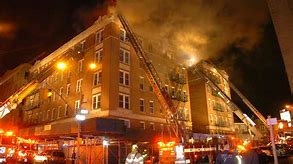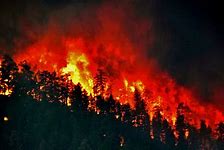Background: Addressing Today’s Most Urgent Global Fire Safety Needs
Fires result in hundreds of thousands of deaths each year with financial losses estimated between 1-2% of global Gross Domestic Product (GDP), a total of approximately $76 billion USD worldwide ([i]). Due to pivotal trends in global urbanization, social inequality, climate change, and human migration, the need to address fire safety as a humanitarian issue has become urgent.

Currently, half of the world’s population lives in cities, and by 2050, two-thirds of people around the globe are expected to live in urban areas ([ii]). Recent statistics indicate that the world’s population will continue to grow beyond 2100, and these population increases are coupled to continued urbanization ([iii]). Global inequality also continues to rise, with the wealthiest 1% of the world having the same total wealth as the poorest 50% ([iv]). Increased urban growth contributes to greater poverty and population density, magnifying the potential devastation of fire in these overcrowded areas.
Climate change poses a significant challenge to fire safety efforts. Research shows that changes in climate leads to warmer conditions and longer fire seasons, resulting in increased area burned and more frequent fire occurrence ([v]). Combined with substantial growth of wildland–urban interface (WUI) around the world (the area where wildland vegetation and the city's buildings intermix), fire-related damage to structures and other economic losses in these areas are predicted to increase, especially in the western US ([vi]). The 2017 Tubbs fire in California caused major damage within the city limits of Santa Rosa, where it destroyed entire urban neighbourhoods and 5,636 buildings, making it one of the most destructive wildfires in US history ([vii]).
In addition to causing hotter and dryer conditions that lead to wildfires, climate change is driving human migration. The Intergovernmental Panel on Climate Change noted that the greatest single impact of climate change may be increased human migration, with millions of people displaced by shoreline erosion, coastal flooding and agricultural disruption ([viii]). According to the Internal Displacement Monitoring Centre, approximately 265 million people worldwide were displaced as a response to natural disasters between 2008-2018 ([ix]). A 2018 World Bank Group report estimates that the impacts of climate change in three of the world’s most densely populated developing regions—sub-Saharan Africa, South Asia, and Latin America—could result in the displacement and internal migration of more than 140 million people before 2050 ([x]).

With significant population migration across the globe due to climate change, as well as conflicts and war, there is an increasing number of people residing in overcrowded areas without adequate living conditions.
Hundreds of millions of people worldwide now live in informal settlements. Informal settlements are over-populated, low-cost residences, typically comprised of shacks. It is estimated that by 2050, there will be 1.2 billion residents living in informal settlements in Africa alone ([xi]). Due to the close proximity of the houses, fires are an ongoing threat in these kinds of settlements. Often there is limited access to water, meaning controlling a fire can be nearly impossible. These problems are exacerbated by the difficulty to regulate such communities.
Fire is an increasing threat not only in informal settlements, but in low- and middle-income communities (LMICs) across the globe, making fire safety a social equality issue. Fire outcomes are generally worse for LMICs, and for those of low socio-economic status, wherever they live. Fire statistics analysis indicates that there are significantly greater fire risks associated with living in social housing and belonging to lower income sectors. These higher risks and poorer outcomes are reflected in greater fatalities, injuries that leave many people with permanent disabilities, and damage to properties, infrastructure and businesses, with impacts not just of immediate economic loss, but also on broader societal development. Urban fires in LMIC’s are an everyday disaster. Recent fire disasters in social housing developments, such as Grenfell Tower in London, demonstrate the higher risk of fire in urban LMICs. The sheer magnitude of the numbers of fires in LMICs, as well as the increased urbanization towards already massive population centres, demonstrate the need for fire safety solutions for these communities.
The large scale of these problems and the increasing societal costs require greater coordinated expertise, public-partnerships, and concerted multidisciplinary research. The International Fire Safety Consortium will fill this need, taking on challenges associated with fire safety in the developing world, social inequality, community resilience, wildfires, climate change and sustainability, and informal settlements.
(i) ([REF]) M. McNamee, B. Meacham, P. van Hees, L. Bisby, W.K. Chow, A. Coppalle, R. Dobashi, B. Dlugogorski, R. Fahy, C. Fleischmann, J. Floyd, E. R. Galea, M. Gollner, T. Hakkarainen, A. Hamins, L. Hu, P. Johnson, B. Karlsson, B. Merci, Y. Ohmiya, G. Rein, A. Trouvé, Y. Wang, B. Weckman, “IAFSS Agenda 2030 for a Fire Safe World”, Fire Safety Journal, 110. DOI: 10.1016/j.firesaf.2019.102889 (2019)https://www.sciencedirect.com/science/article/pii/S0379711219303509
[ii] United Nations, 2018 Revision of World Urbanization Prospects, Population Division, 2018.
[iii] United Nations, World Population Prospects: The 2017 Revision, Key Findings and Advance Tables., in Department of Economic and Social Affairs, Population Division. 2017. p. 53.
[iv] Oxfam, An Economy for the 1%. Oxfam Briefing Paper, 2016. 210: p. 44.
[v] Flannigan, M.D., Stocks, B.J., Turetsky, M.R., Wotton, B.M. 2009. Impacts of climate change on fire activity and fire management in the circumboreal forest. Global Change Biology 15, 549-560.
[vi] Hammer RB, Stewart SI, Radeloff VC (2009) Demographic trends, the wildland–urban interface, and wildfire management. Soc Nat Res 22(8):777–782
[vii] Kramer Heather Anu, Mockrin Miranda H., Alexandre Patricia M., Radeloff Volker C. (2019) High wildfire damage in interface communities in California. International Journal of Wildland Fire, https://doi.org/10.1071/WF18108
[viii] Brown, O. Migration and Climate Change, International Organization for Migration, 2008, p. 9
[ix] Ponserre, S. and Ginnetti, J., Disaster Displacement: A Global Review, 2008-2018, Platform on Disaster Displacement, 2018.
[x] Rigaud, K., et al., Groundswell: Preparing for Internal Climate Migration. World Bank, Washington, DC. 2018. https://openknowledge.worldbank.org/handle/10986/29461
